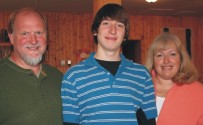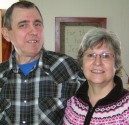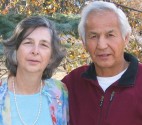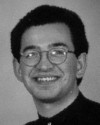Though a bit warmer and windier, July 22, 1989 started out like many other summer days for Ed & Karen Lytle in ministry at Norway House (MB). Later they would learn that all it took was a few children playing with fire across the river to send destruction to all they owned.

Ed & Karen Lytle with youngest son, Brad
In the rush to evacuate, they couldn’t find the keys for their newer truck. There was just enough warning to pack a few things and, with their children, jump into their old truck.
International TV news brings us scenes of those who’ve lost everything. Ed & Karen learned what it’s like. “Initially, there was a helpless feeling,” they remember, “as we wondered, ‘What do we do now?’ ”
The Lytles had just finished building their house less than a year before, with the help of supporting friends. All their labour disappeared in minutes as the fire swept through their forested yard.
“Some things you just can’t replace and, initially, that was pretty discouraging,” they recall. Also, being from the US, a special concern was their immigration papers.
Yet through all this, they saw the Lord’s provision. An RCMP officer, familiar with Immigrations, helped them obtain new papers in short time. Local friends encouraged them, and the Town Council paid for new clothes and personal items, and helped provide a place to live while they rebuilt. The government sent equipment in to clear their property.
“We saw all of this as God’s loving hands!” say Ed & Karen. “We lost a lot of things, but we built friendships and it made us more a part of the community. Because we stayed, it showed people that we really felt called to be here, that we weren’t just posted here by our Mission.”
Knowing God Loved Us
Strong and athletic, a better-than-average ball player, Gordon Gruchy first had symptoms of Multiple Sclerosis when he was 28, but doctors didn’t know the cause. At age 39, while he and his wife Deone were serving in Grand Rapids (MB), he was diagnosed with the disease.
Seven years later their family moved to serve in Watson Lake, Yukon. “Gordon still worked very hard,” remembers Deone about her husband who passed away in 2007 at age 80, “he just had to rest more often.
“When we arrived in the Yukon, the house was so small and in poor condition. Gordon went to work on it immediately. He jacked up the house and stood it on four gas barrels, then dug out a basement by hand. Later he built a Bible camp” (Hidden Lakes Bible Camp, still going).
Deone doesn’t remember the initial effects of Gordon’s health on their ministry, other than the extra rest he needed. “We just accepted it, and went on.” Slowly, though, with no existing treatment, the disease progressed. Symptoms became more noticeable and, by 1983, field missionary work became too physically demanding.
The Gruchys moved to Prince Albert to serve with Tribal Trails TV. Deone assisted with videotape duplication, and Gordon corresponded with viewers. For several years he faithfully and prayerfully wrote personal letters to those who’d called or written seeking spiritual help. Then fading strength and failing eyesight made the task too difficult.
“I never heard Gordon ask, ‘Why me?’ ” says Deone. “As he gradually got worse, I hurt for him. He never grumbled or complained.”
Gordon lived with MS for 41 years. For 24 of those years he needed help with daily living. Deone was the provider, except for the last four years. She insists, “Gordon was easy to care for,” but those looking on knew that it must have been a heavy and tiring load. She does say that, “It was due to my back,” that Gordon moved into a care home in Weyburn (SK), where they had retired.
Through it all, when asked what helped the most, Deone replies, “Loving God, and knowing He loved us.”
Standing in His Grace
With teenagers, Gary & Elaine Fullerton were busy with home and ministry life on Key-Way-Tin Bible Institute’s campus. In the fall of 1991 Gary experienced twitching in his neck. “It progressed,” he says, “and by December my head was frozen to my left shoulder.”

Gary & Elaine Fullerton: life as they knew it totally changed.
Physiotherapy didn’t help. A couple months later an Edmonton doctor diagnosed Cervical Dystonia, a rare genetic brain disorder.
The overall effect on Gary, his family and ministry? “Life as I knew it totally changed,” he answers. “I was always on the go, but now the pain and my head position shut down everything. The medical description: ‘devastating and debilitating pain’ is accurate.”
“I just wanted the husband I knew for 20 years back,” recalls Elaine, “and our three kids just wanted their dad back.” Gary couldn’t study, teach, or drive. He endured two months without medication, then pain meds and muscle relaxants were prescribed which, over time, gave a bit of relief.
The Fullertons began periodic trips to Edmonton, 230 km away, for injections to Gary’s neck. There was an upfront $1800 cost each time, with a 70% refund from Alberta Health arriving just in time to pay off their credit card. The injections continued for several years, but gave little improvement.
In 1998 Gary was sent to Montreal for surgery. The procedure would remove muscles enlarged from overuse, and remove partial nerve ends which, hopefully, would stop sending signals to the muscles. “This wasn’t successful either,” says Gary, “but when you are in such pain you will try anything. The specialists in Montreal said I was the worse case of Cervical Dystonia they’d ever seen.”
In 2003 Gary became one of the first Dystonia cases to receive a deep brain stimulator. It involves two metal pins placed in the brain and a control unit in the chest. ( “I was awake for the surgery and it was an experience!” recalls Gary.) “This has provided the best results,” he reports. “My posture is greatly improved and, though the pain is still constant and I continue on medication, I am able to do so much more.” Gary assists with maintenance duties at KBI. They travel to Edmonton a few times each year for stimulator adjustments, and every two years for a battery change.
Gary remembers his many questions when the disease struck. Among them was, “Lord, why me, when I’m so involved in ministry?”; then, “Lord, what are You saying through all this?”
“I am not the author of my life,” Gary shares. “God has set my course. I trust Him, even when it is hard … probably even more when it is hard! I still can’t say I see the ‘why’ of all this, but it isn’t important anymore. But standing in His grace each day is, and for His glory is!”
Elaine adds, “It feels impossible to sum up what we’ve been through, and all that we’ve learned. We’re so thankful that we can rest in an awesome God, who is all knowing, present, powerful, faithful and loving! (Psalm 18:30)”
Gary tells how Elaine has had to take on a different role in their marriage, and says he couldn’t have come through without her. Others have been an encouragement, too. He remembers a Key-Way-Tin student remarking, “If Gary can keep going for the Lord, so can I!”
In God’s Big Picture
The evening of October 15, 2002, two police officers knocked on Gilbert & Laura Bekkatla’s door. The officers’ initial questions were puzzling. They asked the whereabouts of their daughter, Christina, who happened to be right there with them.

Laura & Gilbert Bekkatla: the Lord used Gilbert Jr. in his parents’ lives
Things soon became shockingly clearer. There had been a fatal collision earlier that day west of Meadow Lake (SK), with one vehicle burned. Gilbert Jr. had left Prince Albert that morning in his sister’s car on his way to start a new job in Yellowknife, NWT.
Gilbert tells of the tearful phone calls to their son, Ian, in Saskatoon and daughter, Patricia, across the city, with the devastating news. Laura soon after got on their home computer, sending emails to their supporters, telling of the accident and asking for prayer. A sleepless night followed. Still in disbelief in the morning, Gilbert tried to call his son’s cell phone. “I still hoped that maybe someone had stolen his car and that’s who was in the accident.”
Laura seemed strong, remembers Gilbert, and was able to prepare meals as their family gathered. Christina, too, was strong for her sister. “I was not,” he says. “Earlier I might have thought I was strong, but I was not prepared for losing my oldest son.”
Their local church and Mission coworkers rallied to comfort the Bekkatlas. NCEMer Tim Gradin planned a gathering that filled their church. Many friends and relatives stood up and shared memories of Gilbert Jr., from various stages of his life.

Gilbert Jr.
Gilbert Jr. had lived most of his earlier childhood in Buffalo Narrows (SK), then moved to Lac La Biche (AB) for three years, where his parents attended Key-Way-Tin Bible Institute. Gilbert & Laura then joined NCEM in 1988 and moved their family to Tadoule Lake (MB), with Gilbert Jr. finishing school at Caronport (SK) High. He then attended Nipawin Bible Institute, followed by training and employment in nature resource management.
The story that impressed the most in the days following his passing was how the Lord used Gilbert Jr. in his parents’ lives. Gilbert & Laura told how their son, at age four, went through a life-threatening bout with spinal meningitis. “That’s what it took for me to come to Christ,” says Gilbert. “Alcohol had dominated my life. Until then I’d lived with brokenness, loneliness and lostness. That’s also when Laura rededicated her life to the Lord.”
Gilbert & Laura thank the Lord for healing their son and giving him back to them for 25 more years.
Until after the funeral, Gilbert says he felt emotionally numb, “just going through the motions.” Then came a period of deep questioning and a feeling of helplessness. “I walked by myself in the middle of the night crying my heart out to God,” he recalls. “I didn’t want to cry in front of my wife and children. I didn’t want my grief to get in the way of helping them to heal.”
He remembers Romans 8:28 being quoted (“in all things God works for the good”) by people with good intentions, but that verse didn’t bring any comfort. In fact, the opposite. “At the time I was thinking, what could be worse than losing a son?”
The Bekkatlas appreciated all the phone calls they received from near and far. “When we were down, somebody would give us a call asking how we were doing. Or we’d get an email or card that encouraged us.” That’s what kept them going, they say, but something else has made a difference.
“It was our ministry,” Gilbert explains. “I didn’t take a break. Right after the funeral we went on with our missionary work. We kept visiting people in Prince Albert and up north. I kept visiting men in the jails. Even now, the more I see people in the state they’re in – their lostness without Christ – then I forget about myself and my problems.”
“We’ve been through darkness,” says Gilbert, “but we still need to help those less fortunate, those who don’t have the Gospel.”
There is still grief and questioning. Romans 8:28, though, has taken on new and deeper meaning. As Gilbert explains, “That verse is not just for this world, but also for the world to come. That’s how I now understand it. In God’s big picture, it will all work together for good.”

Adapted from our Northern Lights magazine (#513). Note: some of the locations and involvements of our missionaries may have changed since the original publishing of this article.

